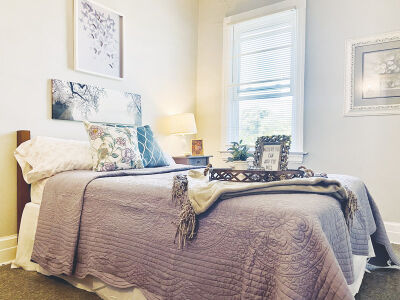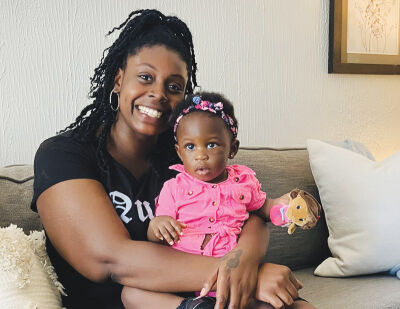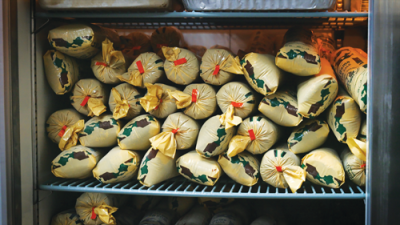
Last June, Humble Design decorated Shaniece and her 1-year-old daughter’s home, providing a safe and comfortable environment for the two.
Photo provided by Chris Tull

: After escaping an abusive relationship and facing homelessness, Humble Design transformed Shaniece’s place into an inspiring space where she can raise her daughter.
Photo provided by Chris Tull
METRO DETROIT — Humble Design is turning houses into homes with its unique approach to ending the cycle of homelessness.
It all began in 2009 when Treger Strasberg, the CEO and founder of Humble Design, was new to the Detroit area. Upon discovering that her new friend, a mother of two, was homeless, she helped the family find a new place but soon realized that it wasn’t enough. The family was sleeping on the floor, and that was a thought that Strasberg could not bear, so she got to work.
Strasberg began collecting items for the family by looking to other friends for donations. Through this process, she was able to furnish and decorate the space in a way that reflected the family and instilled confidence.
Since 2009, the nonprofit has grown from its Detroit origins to serve Chicago, Cleveland, San Diego and Seattle. Humble Design has furnished more than 2,800 homes for more than 8,100 individuals exiting homeless shelters. According to its website, “Families who have benefited from Humble Design have had a 99% success rate of remaining in their homes.”
“Facing housing instability in one way or another is destabilizing, and it does affect mental health. That foundation of stability and a home that really works for you, it’s almost immeasurable,” said Chris Tull, the executive director of Humble Design Detroit.
Tull said that Humble Design’s clients come through its network of approximately 26 social service agencies and shelters that Humble Design partners with in Wayne, Oakland and Macomb counties, including Lighthouse in Pontiac and Cass Community Social Services in Detroit. Typically, a caseworker working with an individual or family will make the referral to Humble Design after the individual or family has secured a place to live.
After the intake process, Humble Design schedules the client for the “deco day,” which can be up to three to four weeks out. Once the client has been scheduled, the designers begin talking to the client directly to get design ideas. The team of designers utilizes donated items to create furnished spaces for their clients.
Oakland County resident Ashley D., a mother of four, turned to Humble Design about five years ago after exiting a shelter. She described her family’s experience with Humble Design as ‘not just a home makeover, but a whole life makeover.’
She said that it felt like her family had returned to a new house after the designers were done.
“I couldn’t believe they could do all that so quickly,” Ashley said. “They even had dinner cooking for us in the kitchen, which I was not expecting. They had a new slow cooker and food in the kitchen, so I didn’t even have to cook dinner. It was just a wonderful experience.”
Ashley said she was impressed with how the designers made use of the space and managed to remember the small details that she had mentioned to them, down to the framed photo of the band Kiss in her children’s room, and the dainty trinkets on her dresser.
“It gave the kids comfort and me comfort, and I was able to focus on other things. I guess that’s how we were able to stay so long, because they were able to relax more, and I got a better job,” Ashley stated.
After renting the house, she purchased the home on her birthday a few years ago.
The Furniture Bank of Southeastern Michigan is a stone’s throw away from Humble Design in Pontiac, said Robert Boyle, the furniture bank’s executive director.
“It’s kind of a little coincidence, the gentleman who owns their building; I know him because he was the one who sold us ours many, many years ago,” Boyle said.
The Furniture Bank of Southeastern Michigan has been around since 1968 and, like Humble Design, serves Wayne, Oakland and Macomb counties.
Similar to Humble Design, the Furniture Bank of Southeastern Michigan also works with a caseworker to connect those in need with gently used furnishings for their living spaces. However, the Furniture Bank operates slightly differently than Humble Design; The Furniture Bank does not offer interior design services and only provides basic furnishings and housewares. The clients pay around 10 to 15 cents on the dollar of the resale value of the furniture to help keep operations going.
“You may pay $200. But for $200, you’re gonna get a dining table and four chairs, three mattresses, three box springs, a couple of dressers, a sofa and a living room chair. And very often, our referral partners have the dollars to cover that through grants,” Boyle stated.
Both nonprofits expressed that there is a great need for these kinds of services.
“We’ve doubled the numbers of families that we’re serving on an annual basis,” Boyle said. “And coming out of the pandemic, with the expiration of the eviction moratorium and high inflation, we’ve seen referrals tick up another 30% over the past few years. So the need is really like nothing I’ve ever seen before.”
In 2023, the Furniture Bank helped just over 2,000 families and provided about 18,000 items valued at $1 million. Humble Design Detroit furnished 151 homes in total last year, which impacted 485 people; 306 of those people were children and 15 were veterans.
Twin beds for children are a highly desired item for which both nonprofits expressed a need.
“We take a lot of pride in getting kids into beds. A lot of times, the bedrooms and beds we put kids in are often the first bed or bedroom they’ve ever had,” Tull said. “I think if you asked anybody here at Humble, that is probably the most gratifying thing that we’re able to provide. When kids see their bedroom for the first time, they generally are charging straight to the bed.”
Humble Design accepts gently used mattress donations and monetary donations for beds. Through its Beds for Kids program, the Furniture Bank was able to raise $30,000 last year with help from local foundations.
“We want families to feel good about the homes that they’re living in and themselves so they can live happy, stable, dignified lives, the way many of us do and many of us take for granted. So if people have things that they can donate, please, there’s a lot of great organizations. The Furniture Bank is one of them, Humble Design is another, and there’s all kinds of others out there. Please make sure that before you just put something in good repair out on the curb, make sure you try to give it to somebody who could really, really use it,” Boyle stated.
For more information on Humble Design, visit humbledesign.org/detroit. To learn more about The Furniture Bank of Southeastern Michigan, visit furniture-bank.org.
 Publication select ▼
Publication select ▼























